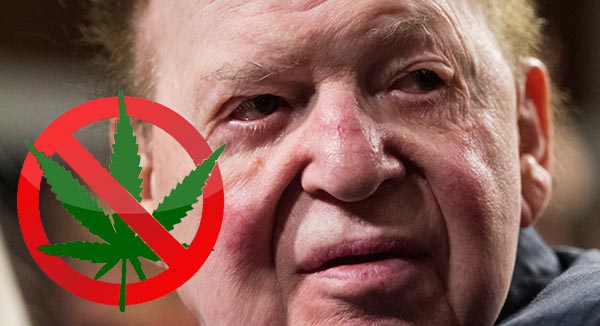Who is this anti-marijuana backer Sheldon Adelson?

Billionaire Who Is Spending Millions of Dollars In Anti-Marijuana Funding
I am writing today about a somewhat mysterious man who has spent tens of millions of dollars to try to prop up marijuana prohibition. In fact, he has become the big fish in the anti-marijuana funding world. His name is Sheldon Adelson, and he is an 82-year-old Las Vegas casino owner (The Sands, the Venetian, and the Palazzo). He is reportedly worth $29 billion, making him the 12th richest person in America.
Adelson once made the late website Gawker’s “Billionaire Shit List,” which called him “evil” for “spending hundreds of millions of dollars trying to get extreme right wingers in office.” And he should be on our “sh*t list” as well for spending funds on prohibition, which as a policy has resulted in the needless arrests of more than 26 million Americans over the last 40 years. Adelson was also the principal financial backer of Freedom Watch, a now defunct political advocacy group founded to counter the influence of George Soros, the latest pro-legislation funder in the country, and liberal groups such as MoveOn.org. Freedom Watch spent $30 million of Adelson’s money in 2008 before fading into oblivion.
In 2014, Adelson gave $5.5 billion to the Drug Free Florida campaign to help defeat the medical use initiative and has given another $1.5 million to fight the pending medical use initiative this year, with more likely to follow. He also just donated $1 million to the group opposing the legislation initiative on the ballot in Massachusetts. In his home state of Nevada, where a full legalization initiative is on the ballot for this upcoming election, Adelson has donated $2 million to oppose the initiative. He recently purchased the Las Vegas Review-Journal for $140 million, since then the paper withdrew its prior endorsement of marijuana legislation for the state.
One cannot help but wonder what would motivate an individual to want to continue a failed public policy that results in the needless arrests of so many of our fellow citizens. In Adelson’s case, it was apparently a personal family tragedy. His 48-year-old son, Mitchell, died in 2005 of a drug overdose involving cocaine and heroine. Another son, Gary, has also struggled with drug addiction and is allegedly estranged from his father altogether. Adelson has said he sees marijuana as a “gateway drug” that led to his sons problems.
Of course, the so-called “gateway theory” has long since been refuted by serious scientists, including the National Academy Of Sciences Institute of Medicine: “There is no conclusive evidence that the drug effects of marijuana are casually linked to the subsequent abuse of other drugs.” And the Rand Corporation: “While the gateway theory has enjoyed popular acceptance, scientists have always had their doubts. Our study shows these doubts are justified.”
And the Netherlands Institute of Mental Health and Addiction recently reached the same conclusion: “As for a possible switch from cannabis to hard drugs, it is clear that the pharmaceutical properties of cannabis are irrelevant in that respect. There is no physically determined tendency toward switching from marijuana to harder substances. Social factors, however, do appear to play a role. The more users become integrated in an environment or subculture where, apart from cannabis, hard drugs can also be obtained, the greater chance that they may switch to hard drugs. Separation of the drug markets is therefore essential.”
In addition, those drug users who do end up using heroin or other far more dangerous drug seldom start with marijuana. Rather recent research shows it is alcohol that is the first drug used in a string of drugs leading to eventual addiction, not marijuana. One can surely sympathize with a sense of loss for any parent who experiences the death of the child, regardless of the cause. But these and other scientific findings suggest that if more jurisdictions legalize and regulate marijuana in a manner similar to alcohol – thereby allowing it’s sale to be governed by licensed, state authorized distributors rather than by criminal entrepreneurs and pushers of various other, hard drugs – even fewer marijuana users will progress to other illicit drugs.
One can surely sympathize with the sense of loss for any parent who experiences the death of the child, regardless of the cause. But that does not justify treating millions of other Americans as criminals.
In the end, our nation’s marijuana policy must be based on science and common sense, not on the tragic examples of those who were unable to control their addictions. I’m confident the pro-legalization forces, with our positive message of the benefits to society from legalization, will carry the day and that we will both out raise funds and outspend our opponents in these upcoming voter initiative campaigns, not just this year, but for as long as it takes to finally end marijuana prohibition.

